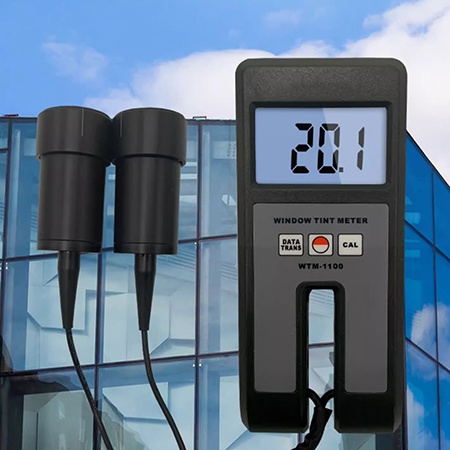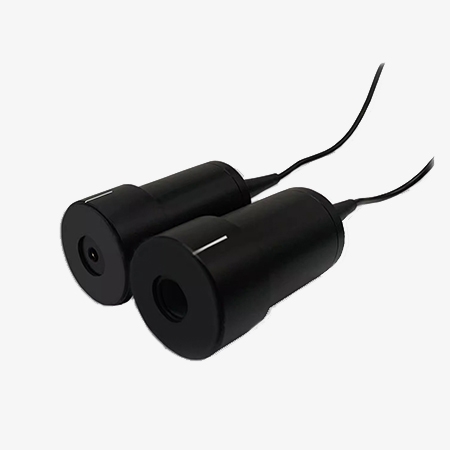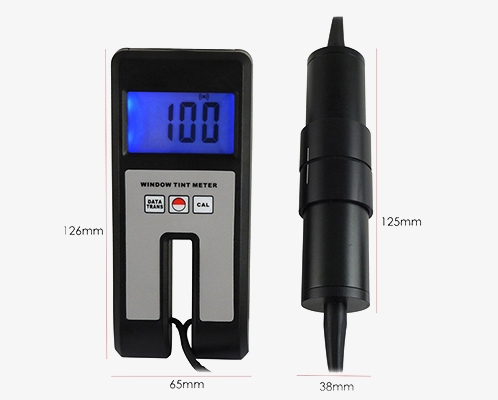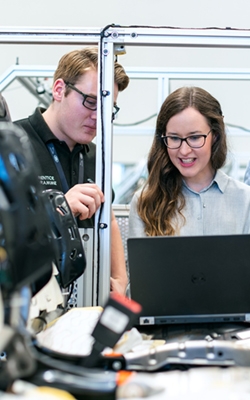SISCO portable tint meter can measure the light permeability of a car or vehicle side and rear windows as well as the different glass products like windows and doors. This window tint meter measures the total amount of visual light transmission. It also has an auto-calibration function for optimum results of measurement.

Backlit screen display, clear readings
- The window tint meter is equipped with a high-definition backlit screen for clear visibility, ensuring accurate readings even in dim lighting or nighttime conditions.
- The large screen design provides intuitive and easy-to-read data, minimizing eye strain during extended use.
- The window tint tester displays real-time measurement results instantly, offering a seamless user experience, including a low-battery warning to ensure the device is always ready for use.

The car tint meter design with an adsorption sensor probe
- The magnetic sensor probe of the car tint meter is designed with a strong magnetic adsorption feature, allowing the probe to securely attach to the car window for hands-free operation and precise measurements.
- Ensures a firm grip on glass surfaces, preventing movement during measurements and providing consistent, accurate results.
- The magnetic probe is gentle on glass surfaces, ensuring no scratches or damage during use.
- Suitable for measuring various types of car windows, including front, side, and rear glass with different thicknesses.
Dimension

Applications
SISCO tint meter is used to measure the visible light transmission (VLT) of glass or window films, ensuring compliance with regulations and assessing performance. It is widely applied in the automotive industry for verifying car window tinting, law enforcement for roadside inspections, construction to evaluate building window films, industrial quality control for testing optical materials, and the solar energy industry to assess the effectiveness of tinted or coated glass panels in blocking UV and infrared radiation while optimizing visible light transmission. Its portability and precision make it an essential tool across various sectors.

Construction

Industrial Quality Control

Solar Energy Industry

Automotive Industry
| Model | SISCO-TM-1100 |
| UV Wavelength | 380 nm |
| Visible Light Wavelength | 380-760 nm |
| Infrared wavelength Center Wavelength | 950 nm |
| Display | 4-digit 10mm LCD |
| Measuring range | 0~100% |
| Resolution | 0.1 |
| Measuring Accuracy | ±2% |
| Thickness of Measured Object | Less than 10mm |
| Light Source | LED light source |
| Measurement Mode | Single, continuous measurement |
| Operating Conditions | Temperature: 0~50℃ Humidity: <90% |
| Dimensions | Host: 126*65*27mm Sensor: 125*38*38mm |
| Weight | 100g (without battery) |
Q1: What is a tint meter?
A1: A tint meter is a device used to measure the Visible Light Transmission (VLT) of glass or window films. It determines the percentage of light that passes through a window, helping to assess whether the tint meets legal or industry standards. Tint meters are commonly used in the automotive industry to ensure compliance with regulations on window tinting, in law enforcement for roadside checks, in construction for evaluating window films, and in industrial quality control for testing tinted materials. These devices are portable, easy to use, and provide precise readings for various applications.
Q2: Can I use a tint meter on all types of glass?
A2: Yes, a Tint Meter can generally be used on most types of glass, including:
- Automotive windows: To measure the tint level of car windows.
- Architectural glass: To assess tinted or coated glass used in buildings.
- Glass with films or coatings: Tint meters can measure the combined transparency of the glass and any applied films, such as UV or reflective coatings.
However, for accurate readings, the glass surface should be clean and free from obstructions, and the meter should be properly calibrated. Some specialized tint meters can also work with laminated or double-glazed windows, but it's essential to check the device’s specifications for compatibility with specific glass types.
Q3: Are tint meters legal to own?
A3: Yes, tint meters are legal to own in most countries. They are commonly used by professionals, law enforcement, and businesses to measure Visible Light Transmission (VLT) of glass and window films. While owning a tint meter is generally legal, its use may be regulated based on local laws, especially for checking compliance with window tinting regulations. Always check local laws to ensure proper use.
Tips: Can the car window tint meter measure all types of car windows?
Yes, the car window tint meter is designed to measure all types of car windows, including front windshields, side windows, and rear windshields. It is compatible with various glass thicknesses and can accurately assess light transmittance levels on both clear and tinted glass. The device is versatile and suitable for vehicles with standard factory-installed glass as well as aftermarket tinted films. However, to ensure the most accurate results, it is recommended to use the meter on clean, smooth surfaces without dirt, smudges, or scratches that could interfere with the readings. Additionally, for heavily curved or uniquely shaped windows, the device’s magnetic probe or sensor alignment may need to be adjusted to maintain accuracy.
Thank you for buying industrial test and measurement equipment on SISCO.com, all products sold by SISCO and the partner cover a 12 months warranty, effective from the date of receiving the products.
What is covered?
SISCO is responsible for providing free spare parts, and free technical support to assist the customer to repair the defective products until the problem is solved.
What is not covered?
- Product purchased from anyone other than a SISCO store or a SISCO authorized reseller.
- Expendable parts.
- Routine cleaning or normal cosmetic and mechanical wear.
- Damage from misuse, abuse or neglect.
- Damage from use of parts other than SISCO approved.
- Damage from use outside the product’s usage or storage parameters.
- Damage from use of parts not sold by SISCO.
- Damage from modification or incorporation into other products.
- Damage from repair or replacement of warranted parts by a service provider other than a SISCO authorized service provider.
- Damage caused by the application environment not meeting the product usage requirements and the failure to perform preventive maintenance.

